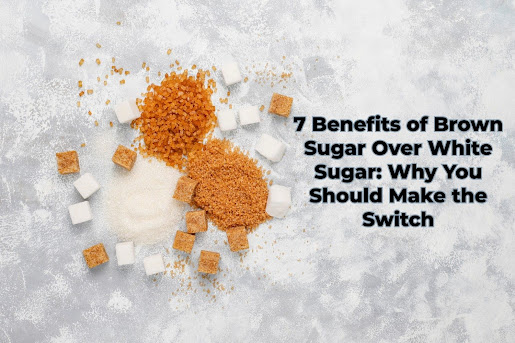7 Benefits of Brown Sugar Over White Sugar: Why You Should Make the Switch
When deciding between brown sugar and white sugar, many people assume they are nearly identical, aside from their color. However, the differences go beyond just appearance. Brown sugar offers several benefits that make it a better option for cooking, baking, and even your overall health. In this blog, we’ll explore the 7 benefits of brown sugar over white sugar and why making the switch could be a smart choice.
1. Less Processed and More Natural
One of the primary benefits of brown sugar is that it undergoes less processing compared to white sugar. Brown sugar retains its natural molasses content, which is stripped away during the refining process of white sugar. This minimal processing results in a more natural and unrefined product, which often means fewer chemicals and additives. If you’re looking for a more natural sweetener, brown sugar is the way to go.
2. Rich in Essential Minerals
Thanks to its molasses content, brown sugar contains trace amounts of essential minerals such as calcium, potassium, iron, and magnesium. While these nutrients are present in small quantities, they provide added benefits compared to white sugar, which lacks any mineral content. Choosing brown sugar over white sugar gives you a slight nutritional boost with every spoonful.
3. Lower Glycemic Index
While all types of sugar should be consumed in moderation, brown sugar has a slightly lower glycemic index (GI) than white sugar. This means it causes a slower rise in blood sugar levels, which is beneficial for those looking to manage their blood sugar. The presence of molasses in brown sugar slows the absorption of sugar into the bloodstream, reducing the risk of sudden spikes in energy levels.
4. Richer, More Complex Flavor
One of the most noticeable advantages of brown sugar is its richer, more complex flavor. The molasses gives brown sugar a deep, caramel-like taste, which enhances the flavor of baked goods, sauces, and marinades. If you're looking to add natural sweetness with a little extra depth to your recipes, brown sugar is the ideal choice.
5. Better for Baking
Thanks to its moisture content, brown sugar is often preferred by bakers for recipes that require soft and chewy textures, such as cookies, cakes, and brownies. Unlike white sugar, which can dry out baked goods, brown sugar helps retain moisture, resulting in softer, more flavorful treats. This makes it a better option for a wide range of baking applications.
6. Contains Antioxidants
The presence of molasses in brown sugar also introduces a small amount of antioxidants. While the amount is minimal, it’s still a noteworthy benefit that white sugar doesn’t offer. Antioxidants help neutralize harmful free radicals in the body, contributing to better health over time.
7. Sustainable and Eco-Friendly
Since brown sugar is less processed than white sugar, its production has a smaller environmental footprint. The reduced refining process means fewer chemicals and energy are used in its creation, making brown sugar a more sustainable and eco-friendly choice. Opting for brown sugar not only benefits your health but also helps reduce environmental impact.
Conclusion
Switching to brown sugar from white sugar offers several health and flavor advantages. From its natural molasses content and added minerals to its richer flavor and better baking properties, brown sugar is a more wholesome choice. With its slightly lower glycemic index and trace amounts of antioxidants, it provides more than just sweetness—it offers health benefits too. Whether you’re looking to enhance your dishes or make a healthier choice, brown sugar is a versatile and beneficial alternative to white sugar.
Next time you’re reaching for sweetener, consider making the switch to brown sugar and enjoy the natural advantages it brings!




Comments
Post a Comment